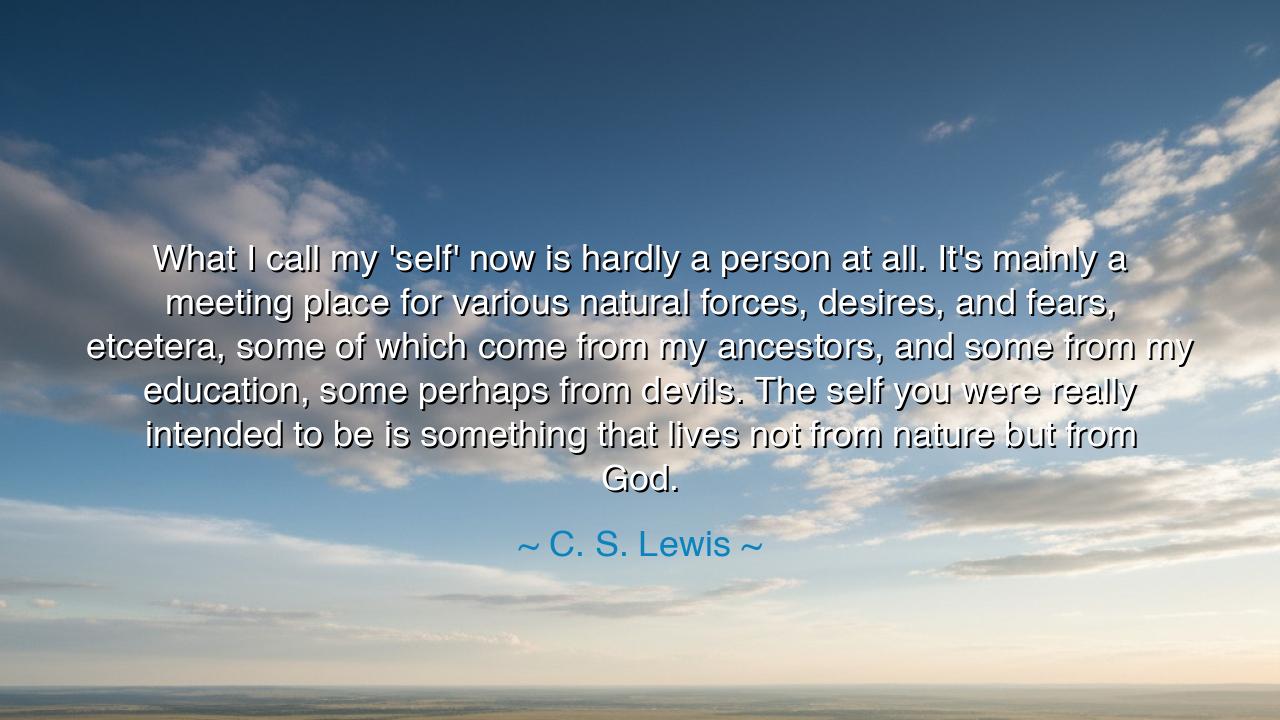
What I call my 'self' now is hardly a person at all. It's mainly
What I call my 'self' now is hardly a person at all. It's mainly a meeting place for various natural forces, desires, and fears, etcetera, some of which come from my ancestors, and some from my education, some perhaps from devils. The self you were really intended to be is something that lives not from nature but from God.






Hear the profound words of C. S. Lewis, who declared: “What I call my ‘self’ now is hardly a person at all. It’s mainly a meeting place for various natural forces, desires, and fears, etcetera, some of which come from my ancestors, and some from my education, some perhaps from devils. The self you were really intended to be is something that lives not from nature but from God.” In this saying lies a meditation on the very mystery of identity: that the self we think we are is but a shadow, a mingling of forces, and that the true self lies hidden, waiting to be awakened by the breath of the divine.
The first truth here is that what we call the self is not as simple or sovereign as we imagine. We walk through life believing ourselves to be whole, independent persons, but Lewis warns us that much of what we call "I" is a patchwork. Desires shaped by ancestors, fears imposed by instinct, habits instilled by education, even whispers of temptation—these all gather in us, pulling us this way and that. Thus, the self in its natural state is not unified, but a battlefield of competing forces, often leading to confusion and despair.
Lewis, a master of spiritual reflection, draws from the ancient wisdom of Christianity to reveal that the true self is not born of chaos but of divine order. He teaches that the identity we were meant to live—the self intended by God—is not a slave to nature, nor bound by instinct, nor defined by culture alone. Rather, it is a being rooted in eternity, a soul fashioned not from dust alone but breathed into life by the Spirit of God. This self is not a meeting place of forces, but a creation destined for unity, meaning, and purpose.
History shows us the struggle between these two selves. Consider Augustine of Hippo, who in his Confessions admits that he once lived a life driven by lust, pride, and ambition—the forces of nature and desire. He sought satisfaction in pleasure and glory, yet found himself restless and fragmented. Only when he turned to God did he discover his true self: no longer tossed about by cravings, but anchored in divine love. Augustine’s story is the very embodiment of Lewis’s teaching: that the natural self must give way to the spiritual self, lest life remain a storm without a harbor.
The words of Lewis also echo through the lives of ordinary people. Many pursue identities defined by career, wealth, or education, thinking these external things will secure who they are. Yet in times of crisis, when jobs fail, fortunes vanish, or reputations crumble, they feel themselves unravel. Why? Because their "self" was built on shifting sands. Only the self from God, rooted in something eternal, can endure the storms of life. It is this deeper identity that Lewis calls us to seek.
The lesson is clear: do not mistake the patchwork of instincts, fears, and cultural voices for your true being. Recognize that much of what you call your self is borrowed, inherited, or imposed. Seek instead the self that is eternal—the one aligned not with the passing forces of the world but with the divine will of God. This is not a rejection of learning or heritage, but a reordering of the soul, where the divine breath animates what is otherwise only dust.
Practical action follows: cultivate silence and prayer, where the clamor of desires and fears may quiet, and the voice of God may be heard. Examine your life and ask: Which parts of me are merely echoes of my past, and which are whispers of eternity? Do not cling too tightly to the false self, for it is meant to die, that the true self may rise. Live not as a creature merely of nature, but as one reborn from God.
So let Lewis’s words echo across your heart: the self you know may be a mask, a meeting place of fleeting forces. But the self you are meant to be is eternal, unshakable, rooted in God’s design. Seek that self with courage, cast off the false with humility, and live as one who has discovered not just who they are—but who they were created to be.






AAdministratorAdministrator
Welcome, honored guests. Please leave a comment, we will respond soon